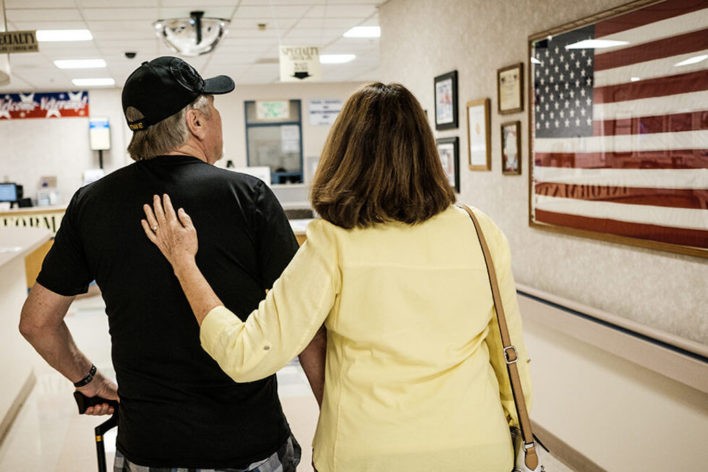VA Support and Resources for Caregivers

What You Need to Know About VA Support for Caregivers
Playing the role of a caregiver – and the mountain of responsibilities that come with it – can be overwhelming. Caregivers of veterans can easily identify resources through the VA Caregiver Support Website and Caregiver Support Coordinators. A plethora of resources for caregivers is summarized here.
Caregivers play a critical and demanding role in promoting the overall health and quality of life of veterans. The Department of Veterans Affairs (VA) serves over 9 million veterans annually and approximately a fourth of them need caregiver support.
The VA and partnering organizations offer a collection of valuable resources designed to support caregivers.
Program of Comprehensive Assistance for Family Caregivers (PCAFC)
Provides education, support, a financial stipend, health insurance, beneficiary travel, and other resources to caregivers of eligible veterans. The program is currently being expanded to support caregivers of veterans in addition to post 9/11 veterans.
RELATED: VA Caregiver Program Expanded
VA Suicide Prevention Toolkit for Caregivers
A resource that focuses on the caregiver’s role in preventing veteran suicide and protecting the caregiver’s mental health. Preventing suicide among veterans and all US citizens, including their caregivers is a priority.
The toolkit includes a brief S.A.V.E. course through collaboration with PsychArmor. The free, online 25 minute video is designed to empower anyone – not just caregivers – to prevent suicide. Risk and protective factors, warning signs, and developing a specific safety and support plan for the veteran are also included.
Resources Designed for Caregivers
The VA Suicide Prevention Toolkit for Caregivers and the VA Caregiver Support Website list resources that support caregivers with managing various aspects of the caregiving experience.
Caregiver Support Coordinators
Available at every VA Medical Center. Coordinators assist caregivers in finding support to meet their needs and with program enrolment. Caregivers can meet with a coordinator via a secure teleconference platform.
Identify a Caregiver Support Coordinator using the search tool or by contacting the VA Caregiver Support Line at 1-855-260-3274 between 8 a.m. and 8 p.m. EST.
Annie Caregiver Text Support
A text messaging service that provides stress management tips three times per week.
RELATED: Telemedicine Benefits for Military and Veterans
Building Better Caregivers (BBC)
A free 6-week online Stanford University workshop that trains caregivers to improve the care they provide and teaches evidence-based self-care strategies. Caregivers will learn
- strategies to manage challenging situations
- effective communication
- managing emotions and feeling more stable and confident
Peer Support Mentoring (PSM) Program
An opportunity for caregivers to receive support, guidance and friendship from caregivers who have had similar experiences. Communication occurs via email, telephone, writing letters, or in face to face meetings. Caregivers participate as mentors or the caregiver being mentored.
The program is available in both English and Spanish.
Resources for Enhancing All Caregivers’ Health (REACH) Intervention
Offers a trained coach who utilizes a Caregiver Notebook to help solve problems encountered by caregivers. Coaches work with caregivers in at least four sessions over a 2 or 3 month period.
The program is available for caregivers of veterans diagnosed with Amyotrophic lateral sclerosis (ALS/Lou Gehrig’s disease), dementia, Multiple Sclerosis (MS), Post-Traumatic Stress Disorder (PTSD), or Spinal Cord Injury/Disorder.
Caregiver Experience Map
This is an ongoing project that seeks to better understand the experiences and challenges of caregivers. Collaboration between the Elizabeth Dole Foundation, the VA, and Phillips and ongoing support from the Wounded Warrior Project provides the means to better understand and positively impact outcomes.
The complex caregiver journey, according to the Caregiver Experience Map, includes three stages:
- Becoming aware of and adjusting to changes in their relationship with the person they are caring for
- Accepting the increased level of responsibility for care, shifting priorities, and reaching out for assistance
- Finding a rhythm, feeling confident as a caregiver, and establishing a new version of normal
VA Caregiver Support Website
Provides access to caregiver support resources on various topics.
- Medication Management Resources
- Tools for Communicating with Healthcare Providers
- Self-Care Resources for Caregivers
- Financial Resources
- Preparing for Emergencies
- Resources for Organization
- Mobility and Fall Prevention Resources
- Home and Community Based Services – including Home Health Aides and Respite Care Services
Resources from VA Partners
Through the Elizabeth Dole Foundation, caregivers can explore resources covering important aspects from employment to faith to specific types of wounds.
In addition to the S.A.V.E. course, PsychArmor offers courses covering self-care, communication, and various other important topics for caregivers.
One Day at a Time
Managing everyday responsibilities and providing around-the-clock care for another person is physically, emotionally, and mentally demanding. When this mountain of responsibilities feels overwhelming, caregivers should remind themselves to reach out for help and take it one day at a time.
RELATED:
- Help for Military Families During COVID-19 Pandemic
- VA Adapted Housing Grants: An Overview
- Mental Health & Resilience Resources for Veterans
- Suicide Prevention Resources for Military & Veterans
- Free Yoga For Veterans
- VA Partnership to Expand Lung Cancer Screenings
- Outdoor Recreation for Veterans: Free and Discount Options
About the author
Lori Waddell serves as Co-director of an emergency response COAD in Montana, a freelance writer, and an Air Force Key Spouse. She is passionate about empowering communities and individuals through knowledge and resources. She currently lives in Montana with her husband and two children.


